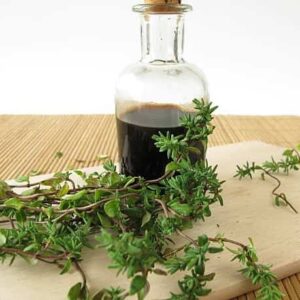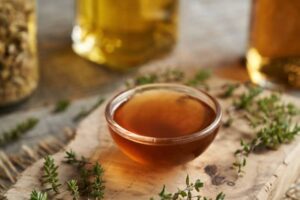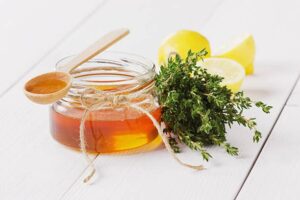Thyme syrup, derived from the aromatic herb Thymus vulgaris, is a widely acclaimed natural remedy celebrated for its effectiveness in soothing coughs and promoting respiratory health. This beneficial syrup, noted for its comforting properties, is simple to make at home with just a few readily available ingredients. The preparation process is straightforward, allowing you to create a potent, homemade remedy that can provide significant relief from coughing and the accompanying discomfort often associated with respiratory issues. In this article, we will guide you through each step of the process to prepare and administer thyme syrup, ensuring you can harness the full therapeutic potential of this remarkable herb.

Thyme, a member of the mint family, has been used for centuries in traditional medicine for its versatile
healing properties. Rich in essential oils, phenolic compounds, and flavonoids, thyme offers a range of health benefits, including antimicrobial, antioxidant, and anti-inflammatory effects. These beneficial components work synergistically to support respiratory fun
ction, alleviate coughing, and promote overall wellness. By preparing thyme syrup at home, you have the opportunity to create a natural remedy that not only addresses symptoms but also nourishes the body with the goodness of this herb.
Preparation of Thyme Syrup:
Ingredients:
- 1 cup fresh or dried thyme leaves
- 2 cups of water
- 1 cup of honey or sugar (adjust according to your desired sweetness level)
 Instructions:
Instructions:
Thoroughly wash the thyme leaves: Begin by washing the thyme leaves under cool running water to remove any dirt or impurities. Gently pat them dry with a clean kitchen towel or let them air dry for a few minutes.
Combine the thyme leaves and water: In a medium-sized saucepan, combine the washed thyme leaves with 2 cups of water. Ensure the leaves are fully submerged.
Bring the mixture to a boil: Place the saucepan on medium heat and bring the mixture to a boil. This process helps to extract the essential oils and active compounds from the thyme leaves.
Simmer the mixture: Once the mixture reaches a boil, reduce the heat to low and let it simmer for approximately 10-15 minutes. Continue simmering until the water reduces to about half its original volume, which concentrates the thyme infusion.
Strain the liquid: After simmering, remove the saucepan from the heat and strain the liquid through a fine mesh strainer or cheesecloth into a clean bowl. This step ensures that all the thyme leaves and any small particles are removed, leaving a clear infused liquid.
Return the infused liquid to the saucepan: Pour the strained liquid back into the saucepan. This prepares it for the next step of sweetening the syrup.
Add honey or sugar: While the liquid is still warm, add 1 cup of honey or sugar, adjusting the amount to your desired sweetness level. Stir well until the sweetener is fully dissolved, creating a smooth and uniform syrup.
Allow the syrup to cool: Let the syrup cool down completely at room temperature. This cooling process helps to thicken the syrup and meld the flavors.
Store the thyme syrup: Once cooled, transfer the thyme syrup into a clean, airtight container for storage. A glass jar or bottle with a tight-fitting lid works well. Store the syrup in the refrigerator, where it can be kept for up to several weeks.
Administration of Thyme Syrup:
 For Adults:
For Adults:
- Dosage: Take one to two tablespoons of thyme syrup as needed. This can help alleviate coughing and soothe the throat.
- Consumption Methods:
- Direct Consumption: Consume the syrup directly by swallowing the recommended dosage.
- Dilution: Alternatively, you can dilute the syrup in warm water or tea. This method not only makes the syrup easier to ingest but also adds a pleasant flavor to your beverage, enhancing its soothing effect.
- Frequency: You can repeat the dosage up to four times a day, depending on the severity of your symptoms and your comfort level.
For Children (Above One Year of Age):
- Dosage: The recommended dosage for children is one teaspoon of thyme syrup. This smaller amount is sufficient to provide relief from coughing and respiratory discomfort.
- Safety Note: Always consult a pediatrician before giving thyme syrup to children, especially those under one year old. This precaution is crucial to ensure the syrup is appropriate for the child’s age and health condition.
- Administration:
- For young children, it may be easier to mix the teaspoon of syrup into a small amount of warm water or tea to make it more palatable.
- Ensure that the child consumes the mixture slowly to allow the syrup to coat the throat and maximize its soothing effects.
By following these guidelines for the administration of thyme syrup, you can effectively manage coughs and promote respiratory health for both adults and children. Always remember to adjust the dosage and method of consumption according to the individual’s needs and consult healthcare professionals when necessary.
Benefits of thyme syrup:
 Antitussive Properties:
Antitussive Properties:
Thyme contains active compounds, such as thymol and carvacrol, which have been shown to possess antitussive properties, effectively suppressing cough reflexes. A study published in the journal “Planta Medica” in 2013 found that thymol exhibited significant antitussive effects by reducing cough frequency and intensity in animal models, supporting the traditional use of thyme syrup as a remedy for cough relief.
Thyme syrup’s effectiveness as a cough suppressant is largely attributed to the presence of thymol and carvacrol, two potent compounds that set it apart from other herbal remedies. Thymol, in particular, has been extensively studied for its medicinal properties. It acts on the cough center of the brain, helping to reduce the sensitivity of the cough reflex. This mechanism makes thyme syrup a particularly effective option for persistent and irritating coughs that are resistant to other treatments. Moreover, thymol has antimicrobial properties, which can help address the underlying causes of coughs, such as bacterial infections, thereby providing a dual benefit.
Another distinguishing feature of thyme syrup is its gentle yet potent action on the respiratory system. Unlike some over-the-counter cough syrups that may contain harsh chemicals or synthetic compounds, thyme syrup offers a natural alternative with fewer side effects. Carvacrol, another significant compound found in thyme, complements thymol by providing additional antitussive effects. It works synergistically with thymol to enhance the overall effectiveness of the syrup. Carvacrol’s ability to inhibit the growth of pathogens further supports respiratory health, making thyme syrup a holistic remedy.
Furthermore, the natural composition of thyme syrup makes it a preferable choice for individuals seeking a non-addictive cough remedy. Many commercial cough suppressants contain codeine or dextromethorphan, which can lead to dependency with prolonged use. In contrast, thyme syrup offers a safe and sustainable option for long-term use without the risk of addiction. This makes it particularly suitable for individuals with chronic coughs or those who prefer to avoid pharmaceutical interventions. The combination of thymol and carvacrol in thyme syrup not only provides effective cough suppression but also promotes overall respiratory wellness, distinguishing it as a superior natural remedy.
Expectorant Properties:
 Thyme syrup stands out due to its rich content of volatile oils, particularly thymol and carvacrol, which are known for their strong expectorant capabilities. Thymol, a key constituent, acts by stimulating the mucous membranes of the respiratory tract, leading to increased mucus secretion and easier expectoration. This makes thyme syrup particularly effective in clearing mucus from the airways, reducing the sensation of chest tightness and promoting easier breathing.
Thyme syrup stands out due to its rich content of volatile oils, particularly thymol and carvacrol, which are known for their strong expectorant capabilities. Thymol, a key constituent, acts by stimulating the mucous membranes of the respiratory tract, leading to increased mucus secretion and easier expectoration. This makes thyme syrup particularly effective in clearing mucus from the airways, reducing the sensation of chest tightness and promoting easier breathing.
Moreover, thyme contains saponins, compounds that also contribute to its expectorant action. Saponins reduce the viscosity of mucus, making it less sticky and easier to cough up. This is especially beneficial for individuals suffering from conditions like bronchitis or chronic obstructive pulmonary disease (COPD), where thick mucus can obstruct the airways and exacerbate symptoms.
In comparison to other natural syrups, thyme syrup offers a multifaceted approach to respiratory relief. While many herbal remedies might focus solely on soothing the throat, thyme’s combination of thymol, carvacrol, and saponins provides a comprehensive expectorant effect. This unique blend not only helps clear mucus but also supports overall respiratory function, making thyme syrup a preferred choice for those seeking an effective natural remedy for chest congestion and mucus-related respiratory issues.
Anti-inflammatory Benefits:
Thyme has been recognized for its anti-inflammatory properties, which can help soothe irritated respiratory passages, providing relief from a sore throat and respiratory discomfort. A study published in “BioMed Research International” in 2017 demonstrated the anti-inflammatory effects of thyme extracts, suggesting its potential in mitigating respiratory inflammation.
One of the primary constituents of thyme is thymol, a potent phenolic compound known for its antiseptic and anti-inflammatory properties. Thymol works by inhibiting the production of inflammatory mediators and enzymes, thereby reducing inflammation in the respiratory passages. This makes thyme syrup particularly effective in soothing sore throats and alleviating respiratory discomfort, distinguishing it from other herbal syrups that may not contain such high levels of thymol.
Additionally, thyme contains other valuable compounds such as carvacrol, rosmarinic acid, and flavonoids, which further enhance its anti-inflammatory effects. Carvacrol, similar to thymol, has been shown to possess strong anti-inflammatory properties by modulating the body’s inflammatory response. Rosmarinic acid, on the other hand, acts as a natural anti-inflammatory and has been found to reduce symptoms of respiratory conditions by inhibiting the migration of inflammatory cells to the affected areas. These compounds work synergistically, making thyme syrup a comprehensive anti-inflammatory remedy.
Moreover, the preparation of thyme syrup involves the extraction and concentration of these beneficial compounds, enhancing their bioavailability and efficacy. When thyme leaves are simmered and combined with a sweetener like honey or sugar, the resulting syrup not only preserves the anti-inflammatory properties of thyme but also provides a soothing and palatable form of administration. This concentrated form ensures that users receive a potent dose of anti-inflammatory agents with each serving, offering superior relief compared to other herbal syrups that may not be as concentrated or effective.
Antioxidant Activity:
It is rich in antioxidants, which help neutralize harmful free radicals in the body and reduce oxidative stress. A study published in the “Journal of Traditional and Complementary Medicine” in 2014 reported the potent antioxidant activity of thyme extracts, indicating its potential in supporting overall respiratory health.
Moreover, thyme syrup’s antioxidant properties are bolstered by its natural flavonoid content, including apigenin, luteolin, and naringenin. These flavonoids are known for their strong antioxidant capabilities and their role in supporting the immune system. The combination of these flavonoids with the phenolic compounds found in thyme creates a synergistic effect that enhances the overall antioxidant capacity of the syrup. This distinguishes thyme syrup from other natural remedies, making it a comprehensive solution for those seeking to improve their respiratory health and overall well-being through antioxidant support.
In addition to its impressive antioxidant profile, thyme syrup also benefits from the natural preservative qualities of its ingredients. The antioxidants not only protect the body but also help in preserving the efficacy and shelf-life of the syrup itself. This means that thyme syrup can remain potent and effective over time, ensuring that users receive the maximum health benefits with each dose. The combination of potent antioxidants and natural preservation makes thyme syrup a superior choice among herbal remedies.
Conclusion:
Thyme syrup, made from thyme leaves, water, and sweetener, is a quick and easy-to-make remedy for relieving cough and supporting respiratory health. In addition to its traditional use, scientific research has provided evidence supporting thyme syrup’s efficacy in alleviating cough, promoting expectoration, and providing anti-inflammatory and antioxidant benefits. By incorporating thyme syrup into your cough-relief regimen, you can harness the power of nature to ease cough symptoms and promote respiratory well-being.
It is important to note that while thyme syrup offers promising benefits, it should not be considered a replacement for prescribed medications or professional medical advice, especially for chronic respiratory conditions. Always consult with a healthcare professional before using thyme syrup or any natural remedy, especially if you have pre-existing health conditions or are taking medications. Embrace the potential of thyme syrup as a complementary approach to support your respiratory health and enhance your overall well-being.
Contraindications of Thyme Syrup Consumption:
While thyme syrup offers various health benefits, there are certain situations in which its consumption may not be suitable. Here are some contraindications to consider:
- Allergies:
Individuals with known allergies to plants from the Lamiaceae family, which includes thyme, may experience allergic reactions upon consuming thyme syrup. Common symptoms of allergies include itching, rash, hives, or difficulty breathing.
- Pregnancy:
Pregnant women should exercise caution when using thyme syrup as a remedy due to limited research on its safety during pregnancy. It is advisable to consult with a healthcare professional before use.
- Breastfeeding:
Similarly, there is insufficient evidence to determine the safety of thyme syrup during breastfeeding. Nursing mothers should seek medical advice before using thyme syrup.
- Gastrointestinal Disorders:
Thyme may irritate the gastrointestinal tract in some individuals, leading to discomfort or exacerbation of certain gastrointestinal conditions. Those with gastroesophageal reflux disease (GERD) or peptic ulcers should avoid thyme syrup.
- Bleeding Disorders:
Thyme has mild anticoagulant properties, which could potentially interfere with blood clotting. Individuals with bleeding disorders or those taking anticoagulant medications should avoid thyme syrup or consult a healthcare professional before use.
Surgery:
Due to its potential effects on blood clotting, it is advisable to discontinue thyme syrup consumption at least two weeks before scheduled surgery to reduce the risk of excessive bleeding.
Children under One Year Old:
Thyme syrup is not recommended for infants under one year old due to their delicate immune systems. It is best to avoid thyme syrup in this age group.
Note:
While thyme syrup is a natural and effective remedy for cough relief and respiratory health, it may not be suitable for everyone. Individuals with allergies to thyme or its related plant family, pregnant or breastfeeding women, those with gastrointestinal disorders, bleeding disorders, or scheduled surgeries should exercise caution or avoid thyme syrup consumption altogether. As with any natural remedy, it is essential to consult a healthcare professional before using thyme syrup, especially if you have any underlying health conditions or are taking medications. Safety is paramount, and seeking medical advice will ensure responsible and appropriate use of thyme syrup for your specific health needs.
Click here if you want to see more articles from the remedies category
Reference
- Sienkiewicz, Monika, et al. “The potential of use basil and thyme essential oils as effective antibacterial agents.” Molecules 17.7 (2012): 7401-7413.
- Alqasoumi, Saleh, and Maha Al-Sohaibani. “Thymoquinone and Nigella sativa oil protection against methotrexate-induced hepatotoxicity in rats.” Pharmacognosy research 3.4 (2011): 251.
- Nolkemper, Silke, et al. “Antiviral effect of aqueous extracts from species of the Lamiaceae family against Herpes simplex virus type 1 and type 2 in vitro.” Planta medica 76.06 (2010): 659-665.
- Mahboubi, Mohaddese. “Thymol and carvacrol strongly inhibit biofilm formation and growth of carbapenemase-producing Gram-negative bacilli.” Cellular and Molecular Biology 64.7 (2018): 91-96.
- Bozin, Biljana, et al. “Antimicrobial and antioxidant properties of rosemary and sage (Rosmarinus officinalis L. and Salvia officinalis L., Lamiaceae) essential oils.” Journal of Agricultural and Food Chemistry 55.19 (2007): 7879-7885. https://pubmed.ncbi.nlm.nih.gov/17708648/
- Combination of Carvacrol and Thymol: Antimicrobial Activity Against Staphylococcus aureus and Antioxidant Activity https://pubmed.ncbi.nlm.nih.gov/31009261/
Disclaimer:
The information provided in this article is intended for educational purposes and is not a substitute for professional medical advice. While natural remedies may offer potential benefits, it is important to understand that individual responses may vary. Therefore, it is advisable to consult a qualified health professional before integrating new naturopathic practices into your routine. This ensures you receive personalized guidance tailored to your specific needs and health profile. Prioritizing your well-being and safety is essential, and seeking professional advice empowers you to make informed decisions about your naturopathic regimen.
Additionally, it is important to note that while we strive to provide accurate and helpful information, we do not assume any responsibility for the use of these remedies. Individual experiences and results may vary, and it is the reader's responsibility to exercise caution and discretion when incorporating new naturopathic practices into their routine. By continuing to use these remedies, readers acknowledge and accept this disclaimer.

 Instructions:
Instructions: For Adults:
For Adults: Antitussive Properties:
Antitussive Properties: